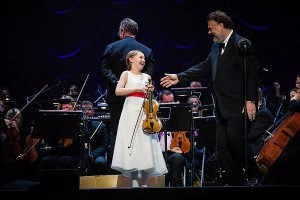 If you have been reading my miniseries on the shenanigans of abusive parents beating their children to musical stardom, this little story will probably restore your faith in humankind. I am talking about the pianist, violinist and composer Alma Elizabeth Deutscher, born in Oxford in 2005! She started playing the piano at age two and the violin at three. Her parents gave her a little toy violin, and within less than a year she was playing Handel sonatas. She improvised on the piano by age 4, and by five wrote down her compositions. Things progressed rapidly, and at age six she composed her first piano sonata, followed a year later by the short opera The Sweeper of Dreams. A violin concerto emerged at age 9, which she premiered in 2015. And not to be outdone, her first full-length opera Cinderella premiered in Vienna on 29 December 2016, conducted by Zubin Metha. Deutscher is the daughter of Janie Steen and the Israeli linguist Guy Deutscher, and according to her father, “the family was unprepared for the intense media exposure, but view it as their most important task to ensure that she has a happy childhood.”
If you have been reading my miniseries on the shenanigans of abusive parents beating their children to musical stardom, this little story will probably restore your faith in humankind. I am talking about the pianist, violinist and composer Alma Elizabeth Deutscher, born in Oxford in 2005! She started playing the piano at age two and the violin at three. Her parents gave her a little toy violin, and within less than a year she was playing Handel sonatas. She improvised on the piano by age 4, and by five wrote down her compositions. Things progressed rapidly, and at age six she composed her first piano sonata, followed a year later by the short opera The Sweeper of Dreams. A violin concerto emerged at age 9, which she premiered in 2015. And not to be outdone, her first full-length opera Cinderella premiered in Vienna on 29 December 2016, conducted by Zubin Metha. Deutscher is the daughter of Janie Steen and the Israeli linguist Guy Deutscher, and according to her father, “the family was unprepared for the intense media exposure, but view it as their most important task to ensure that she has a happy childhood.”
Alma Deutscher: Violin Concerto, “Allegro vivace e scherzando”
To mere mortals it is almost inconceivable, but Alma’s compositions arrive “fully formed.” She once told a newspaper, “The music comes to me when I’m relaxing. I go and sit down on a seat or lie down. I like thinking about fairies a lot, and princesses, and beautiful dresses.” Alma explained, “When I try to write a melody it never comes to me.
It usually comes to me either when I’m resting or when I’m just sitting at the piano improvising, or when I’m skipping with my skipping rope. Or even when I’m trying to do something else, when somebody is talking to me or I’m trying to do something, then I hear this beautiful melody.” Her inspiration also comes from an imaginary country called Transylvanian. “I made up my own land,” she explains, “with its own language and there are beautiful composers there, named Antonin Yellowsink and Ashy and Shell and Flara.” However, the most difficult part of composing, according to Deutscher is to create larger and complex works from an initial melody. “Lots of people think that the difficult part of composing is to get the ideas, but actually that just comes to me. The difficult bit is then to sit down with that idea, to develop it, to combine it with other ideas in a coherent way. To sit down and develop and combine it, and afterwards to tweak it and to polish it – that takes ages…”
Alma Deutscher: Cinderella “When the day falls into darkness”

Credit: https://alma.puxapps.com/
Wolfgang Amadeus Mozart: Piano Concerto, No 8, K. 246 (cadenza by Alma Deutscher)




She also recently premiered her new piano concerto in austria and San Jose Opera performing her opera this december..this girl is definitely on a roll.
Creativity is within all of us it is just a matter of how your tuned to it. She is well tuned and can hear creativity through music daily.